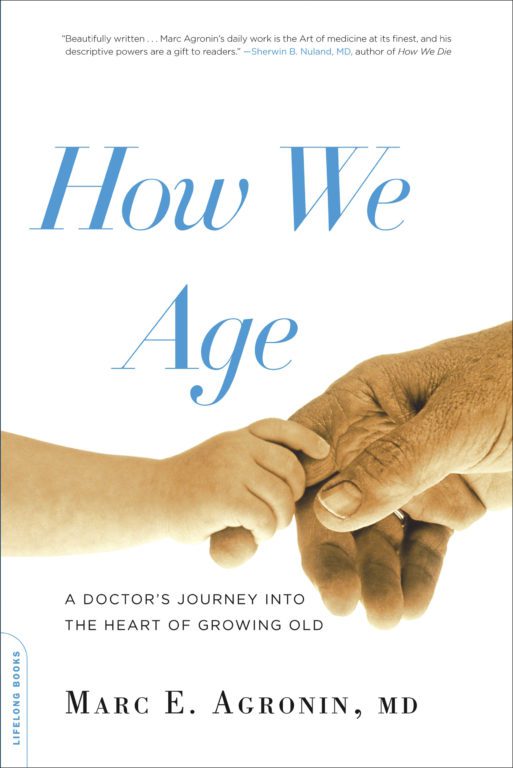 From the book How We Age: A Doctor’s Journey into the Heart of Growing Old by Marc E. Agronin, MD. Excerpted by arrangement with Da Capo Lifelong, a member of the Perseus Books Group. Copyright (c) 2011.
From the book How We Age: A Doctor’s Journey into the Heart of Growing Old by Marc E. Agronin, MD. Excerpted by arrangement with Da Capo Lifelong, a member of the Perseus Books Group. Copyright (c) 2011.
Until the year before his death, aging had been a relatively benign process for my grandfather. He practiced medicine and surgery until the age of eighty and then retired not because he felt any desire to but because it just seemed logical. When he became ill, however, aging caught up to him quite quickly. In the summer of 1996 he was diagnosed with an aggressive form of prostate cancer. Suddenly, he needed me for support and advice, and we spoke nearly every day about how to manage some of his physical discomfort. Of course, as a newly minted psychiatrist I was of little value to his medical management, and I left that up to my uncle, who had taken over his practice. But our conversations were not really about my grandfather’s pain; they were, it seemed to me, cover for dealing with aging and death.
As the de facto family historian I also knew that I had to record his life stories, and so at Thanksgiving we sat down on the porch of my grandparents’ house for a taped interview. The life review was almost too painful for him, however, and he broke down crying at several points. I had never seen him cry before, let alone show sadness, but I persisted with the camera, knowing that time was short. In my work with older individuals it is always painful to witness the crumbling of their composure in the face of loss and grief, but I can steel my own emotions because I rarely know what the person was once like. But such was not the case with my grandfather, and I vacillated between denial and despair. As I was saying my good-byes and leaving my grandparents’ home at the end of the weekend, he pulled me aside and stated rather perfunctorily that this was probably the last time I would see him. His words were sterile and clinical — a doctor’s way of parting with a patient. But I knew that this was his best effort at saying good-bye. A doctor myself, I brushed off his words in the same manner I might use leaving the clinic at day’s end — “No, Grandpa; I’ll see you soon. Call me tomorrow.”
I reflected on these moments as I sat at his bedside that spring and tried to contain my emotions. He was not only my grandfather, but also my mentor, my inspiration, and, from my earliest childhood days, my own doctor. But now his life of eighty-three years was drawing to a close, and I was standing witness at the point where aging meets death. Shortly after my grandparents passed away, I compressed much of my grief into an odd fantasy that in the afterlife they had moved down to Miami Beach and were experiencing eternal bliss together, with endless sunny beaches and Early Bird specials. Florida, I imagined, was actually some form of Shangri-La where all of our deceased elderly could be found happily wandering around if we just looked hard enough.
No other period of life has such a feared and mysterious ending. Childhood ends with the budding of puberty and the new challenges of adolescence. Adolescence passes away in the excitement of pulsating hormones, shedding its awkward, uncertain skin in the journey into young adulthood. The subsequent stages of adulthood bring undiscovered treasures of love, children, work, and spirit. Even in the face of failure or lost opportunities, there is always hope for something new. But aging seems to bring this process to a halt. The horizon is unknown except for the single fact that a true ending will come …
Marc E. Agronin, M.D., a graduate of Harvard University and Yale Medical School, is a board-certified geriatric psychiatrist and the author of How We Age, among other titles.
Check back soon for Marc E. Agronin’s exclusive interview with SevenPonds in “Professional Advice“!

 How We Age by Marc E. Agronin
How We Age by Marc E. Agronin


 Debating Medical Aid in Dying
Debating Medical Aid in Dying
 “Help Me, Helen”
“Help Me, Helen”















